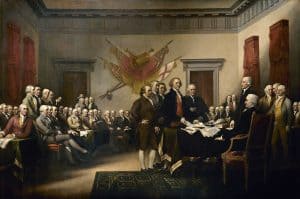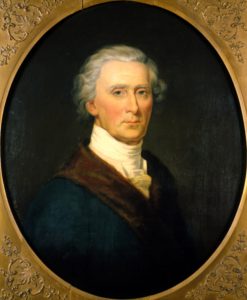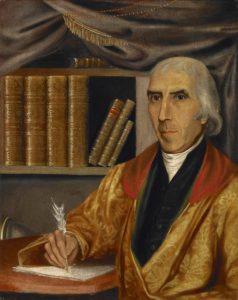May your mind be thoroughly impressed with the absolute necessity of universal virtue and goodness, as the only sure road to happiness, and may you walk therein with undeviating steps.
—Abigail Adams—
The general principles on which the fathers achieved independence were the general principles of Christianity. I will avow that I then believed, and now believe, that those general principles of Christianity are as eternal and immutable as the existence and attributes of God.
—John Adams—
Thus says the Lord: “Stand in the ways and see, And ask for the old paths, where the good way is, And walk in it; Then you will find rest for your souls.”
—Jeremiah 6:16, to the people of Judah—
Key point: The basis for American liberty isn’t autonomy; it’s pursuing one’s dreams and goals in accordance with “the Laws of Nature and of Nature’s God.”
A streamlined edition of this article is available here.
“Principles of Liberty” is the article providing a “treasure map” for the new Bible study series titled “Principles of Liberty: Ten Biblical Truths Embedded in the Declaration of Independence.” You can access the article here and the Bible study series here. Both examine ten biblical truths that are present in what we might call America’s “birth certificate.”

Are the tenets the Founders upheld as self-evident really clear? Are they genuinely self-evident to us today? The answer is both yes and no. A few principles indeed are obvious, but others are evident more obscurely, on a sub-conscious level for many. We need to understand and affirm all of these truths. Regardless of whether they are extremely obvious or evident “under the surface,” they are realties, and we benefit when we uphold them and don’t resist them.

Other considerations apply as well. These tenets will not readily be recognized as biblical by those who are unfamiliar with Scripture; and even many people today who are familiar with the Bible may need some help “connecting the dots” between Declaration principles and the biblical truths they reflect. After all, 244 years have passed since the Declaration was adopted and signed. We need to appreciate the historical setting of the Founders and the charter they forged, as well as the philosophical and even theological underpinnings on which the Declaration of Independence still rests. We cannot afford to try to understand all the Founders said without learning important historical and cultural information. Why? Because what we don’t know, and what we erroneously think we do know, will rob us of genuine understanding.
The Path to Satisfaction and Fulfillment
Exploring the annals of history and what the Bible clearly teaches removes much of the debris we initially encounter. Here is one example. It is item #3 on or ten-item list of biblical truths in the Declaration.
God and His laws establish the track on which men and nations must travel to attain happiness, fulfillment, and greatness; and to reach their God-given potential.
Here is a portion of what we said about this in our main article:

Our Founders knew that men and women cannot live fulfilled lives by merely following their whims and desires, treading down whatever paths their raw appetites direct them. Rather, they must “assume among the powers of the earth, the separate and equal station to which the Laws of Nature and of Nature’s God entitle them.” The word entitle is important here, and it appears both in Jefferson’s draft and in the final document. Entitle as the Founders used it is light years away from the meanings it and its various forms frequently carry today. How do we know this? Because according to the men who ratified the Declaration, that to which the people are entitled is granted and governed according to “the Laws of Nature and of Nature’s God.” By contrast, today, people look to government for everything to which they believe they are “entitled.”

Take note! The parameters set by “the Laws of Nature and of Nature’s God” are not nearly as restrictive as they are liberating.…[Yet s]adly, the idea that liberty and law go together is a foreign concept to Americans today. Many, if not most, see these two elements as totally contradictory. But they’re not! Not only are they compatible; they’re inseparable! How can a nation prosper? How can liberty thrive? Only under God!…
Charles Carroll, [a] signer of the Declaration, declared, “Without morals a republic cannot subsist any length of time; they therefore who are decrying the Christian religion, whose morality is so sublime and pure (and) which insures to the good eternal happiness, are undermining the solid foundation of morals, the best security for the duration of free governments.”
Some may initially believe God’s laws are overly restrictive. After all, this is what our culture teaches, even when it doesn’t use these exact words. Yet upon reflection and study, evidence mounts that while divine laws are restrictive on one level, they are liberating on a far deeper and more significant one. Freedom and liberty, therefore, actually are found in a place where many today would never think to look.
Freedom and liberty actually are found in a place where many today would never think to look.
The Founding Fathers got a great many things right that contemporary Americans dismiss as “old-fashioned” and “archaic.” In our Bible study, we find that on issue after issue, modern thinking is deceptive and the Founding Fathers actually had tremendous insights.
The Warning

A train runs best when it’s on the tracks that were designed and built for it. Indeed, a train cannot run at all without being “on track.” While there is great benefit to finding liberty along the “track” of God’s laws, we must hear and heed the warning associated with failing to revere divine commands and with rejecting them outright. As we noted at the top, the prophet Jeremiah preached God’s message to God’s people in the Southern Kingdom of Judah. “Thus says the Lord,” declared Jeremiah. “’Stand in the ways and see, And ask for the old paths, where the good way is, And walk in it; Then you will find rest for your souls.” We find this in Jeremiah 6:16, but even before we move on to read the 17th verse, we encounter resistance: “But they said, ‘We will not walk in it.’”
Verse 17 indicates the people were resolute in their determination not to follow God’s way. Then subsequent verses issue a disturbing warning. God will not ignore His people’s indifference or their deliberate departure from His benevolent guidance for their lives in the form of His laws. Here are verses 17 through 19 of Jeremiah 6:
17 Also, I set watchmen over you, saying,
‘Listen to the sound of the trumpet!’
But they said, ‘We will not listen.’
18 Therefore hear, you nations,
And know, O congregation, what is among them.
19 Hear, O earth!
Behold, I will certainly bring calamity on this people—
The fruit of their thoughts,
Because they have not heeded My words
Nor My law, but rejected it.
America is not ancient Judah, but just as God did not excuse His own chosen people for their disobedience, neither will He excuse Americans for rejecting Him, especially when they have heard the truth repeatedly. Jedidiah Morse (1761-1826) became known as the “father of American geography.” He was an educator and the father of American inventor and Samuel Morse, a painter, inventor, and telegraphy pioneer. The elder Morse observed,

To the Kindly influence of Christianity we owe to that degree of civil freedom, and political and social happiness which mankind now enjoy. In proportion as the genuine effects of Christianity are diminished in any nation, either through unbelief, or the corruption of its doctrines, or the neglect of its institutions: in the same proportion will the people of that nation recede from the blessings of genuine freedom, and approximate the miseries of despotism. I hold this to be a truth confirmed by experience. If so, it follows, that all efforts made to destroy the foundations of our holy religion, ultimately tend to the subversion also of our political freedom and happiness. Whenever the pillars of Christianity shall be overthrown, our present republican forms of government, and all the blessings which flow from them, must fall with them.
There is, however, hope! As Americans, we must repent of our wayward deeds and return to the Lord! The prophet Joel, who also was God’s spokesman to the people of Judah but during a different period, declared,
2:12 “Now, therefore,” says the Lord,
“Turn to Me with all your heart,
With fasting, with weeping, and with mourning.”
13 So rend your heart, and not your garments;
Return to the Lord your God,
For He is gracious and merciful,
Slow to anger, and of great kindness;
And He relents from doing harm.
Moreover, the prophet Jeremiah also said this:
3:21 A voice was heard on the desolate heights,
Weeping and supplications of the children of Israel.
For they have perverted their way;
They have forgotten the Lord their God.
22 “Return, you backsliding children,
And I will heal your backslidings.”
Returning to God, or repenting of our sins, means doing an about-face and, with God’s help, adopting a new way of thinking and of living.
Five Issues Contemporary Americans Need to Rethink in Light of What the Founders Believed and Upheld

How do we need to change our thinking? The Bible study I’m highlighting today explores needed reform in American perspectives on a number of important matters. Here I’ll cite five specific items. I hope these will whet your appetite to explore these themes using the Bible study material. Today, we think we know what these five terms mean, and we assume we know what the Founders meant when they used them:
law, liberty, rights, equality, and entitle.
However, regarding each of these, we need to—indeed we must—rediscover what the Founders meant and believed. Their approach was biblical. I am confident that with a newfound understanding, many of us will embrace their perspectives! Our departures from their thinking in these five areas actually is a big reason for the increasing loss of freedom we are experiencing in America today. Principles of Liberty: Ten Biblical Truths Embedded in the Declaration of Independence dives into the meaning of each of these terms and the historical context in which the Founders used each one.

But wait! someone is sure to object. Returning to the Founders’ perspective on, say, equality obviously will take our country back to a pre-civil-rights era! No, it won’t. It actually was their perspective on equality that eventually gave birth to the civil rights movement and all the positive changes that have resulted from it! Before that, it was “Declaration ideals” that compelled America to end slavery, even though it took a civil war to do it! We readily can admit the Founding Fathers didn’t apply all they said in the Declaration of Independence with perfect consistency, but I dare say that we don’t apply everything we claim to believe with perfect consistency, either. Their flaw in this area must not compel us to reject everything they believed!
Mark it down. This journey absolutely will be one of the most enlightening you’ll ever experience! This is a worthy quest if there ever were one!
Join me, won’t you?
B. Nathaniel Sullivan
Copyright © 2020 by B. Nathaniel Sullivan. All rights reserved.
Unless otherwise indicated, Scripture passages have been taken from the New King James Version®. Copyright © 1982 by Thomas Nelson, Inc. Used by permission. All rights reserved.
top image credit: portraits of Abigail and John Adams, 1766, by Benjamin Blyth

Be First to Comment